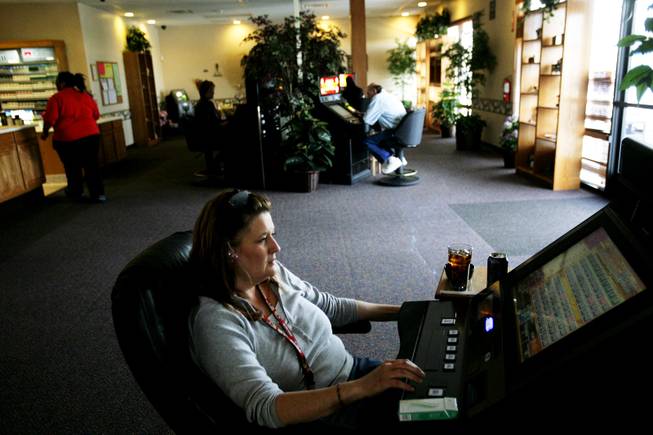
Cherie Nepote plays a slot machine at Dotty’s near Eastern and Serene in Henderson on Thursday, March 24, 2011.
Tuesday, Dec. 2, 2014 | 2 a.m.
Clark County commissioners are set to decide today on changes to tavern gaming regulations meant to rein in so-called slot parlors like Dotty's.
The new rules are meant to force Dotty's and other similar businesses to look and act more like traditional bars or risk losing more than half their slot machines.
The changes have been in the works since March and will be voted on by commissioners following a public hearing that starts at 10 a.m. at the Clark County Government Center, 500 S. Grand Central Parkway.
Heading into the debate, here's a breakdown of the issue:
Background
When Dotty's opened its first six taverns in Southern Nevada in 1996, many doubted the company's unusual business model.
The chain, which started in Oregon, offers a quiet atmosphere with a homey decor meant to cater to women. Although Dotty's sells food and alcoholic drinks, the 15 or so slot machines at each outpost are the main draw.
The company's popularity and success has fueled its growth to 102 locations statewide, including 28 in unincorporated Clark County that would be affected by the proposed changes. It's also spawned a series of copycat businesses with names like Molly's and Jackpot Joanie's.
But Dotty's success has put it in the cross-hairs of lawmakers and the casino industry, who for years have said the company's business model makes it more like a mini-casino than a bar.
Dotty's was the target of new county regulations in 2011 meant to eliminate the slot parlor model. The company made renovations to its locations to attempt to comply with the law, but county inspectors cited 15 locations last year for violations.
The citations were never enforced, but they did start the conversation that led commissioners to consider additional rules today.
The law
Under state and county laws, slot machines at bars are supposed to be incidental to the primary business of selling food and drinks. Put differently, slot machines can be an amenity, but not the main attraction.
But the law never strictly defined incidental or how much money is too much for a bar to make from its slot machines. This left an opening for companies like Dotty's, whose locations often draw far more than half their revenue from gaming.
The biggest change in Tuesday's proposed law is a two-pronged test: operate a full kitchen and embed slot machines in the bar top, or prove that slot machine earnings don't exceed 50 percent of revenues.
If a bar doesn't meet at least one of the conditions, the number of slot machines it's allowed could be slashed from 15 to seven.
The law also goes into specifics about how the bar should look and operate. For instance, the bar top must be at least 42 inches tall and 24 inches wide, and the kitchen must operate for at least 16 hours a day.
Commissioner Steve Sisolak, who is pushing the changes, said the specifics are needed to close loopholes from the vaguely worded 2011 law.
"I was hopeful that people would come into compliance and understand the spirit of the law," he said. "Unfortunately, some operators chose to ignore the spirit of the law."
Supporters
Although Sisolak has been the commission's most vocal advocate for change, stricter regulations for Dotty's also are being pushed by Station Casinos and Golden Gaming, which operates the PT's Pubs and Sierra Gold chains.
The county received 109 written comments in support of the changes, with dozens coming from employees of those two companies.
Lobbyists for Station Casinos and Golden Gaming have long argued that they simply want Dotty's to follow the same rules that apply to other bars, something they say the new regulations will help accomplish. Dotty's slot parlor model emphasizes gaming as the primary business, something that's only allowed at casinos. As a result, they argue, Dotty's is able to profit unfairly from unfettered slot machine gaming without paying the same taxes as a casino.
Opponents
Dotty's has been the chief opponent of the changes, arguing that it is being unfairly targeted with regulations specifically designed to drive the company out of business.
Dotty's officials maintain that they've complied with all requirements of the 2011 law, including building kitchens and embedding slot machines in bars. The company says it's being targeted because it doesn't look like a traditional sports bar and that the new changes could cripple its operations.
Susan Johnson, Dotty's general counsel, estimated that it would cost the company $6.5 million to renovate its locations to comply with the new law.
Other bar owners have also expressed opposition, mostly over how a "grandfather clause" meant to exempt them from changes was worded. Under a previous version of the bill, bars operating before December 2006 could keep doing business unchanged, but if the bar was sold the new owner would have to bring it into compliance. Bar owners worried this would affect the resale value of their businesses. As a result, Sisolak changed the wording so that the grandfather exemption applies even if a bar is sold.

Join the Discussion:
Check this out for a full explanation of our conversion to the LiveFyre commenting system and instructions on how to sign up for an account.
Full comments policy